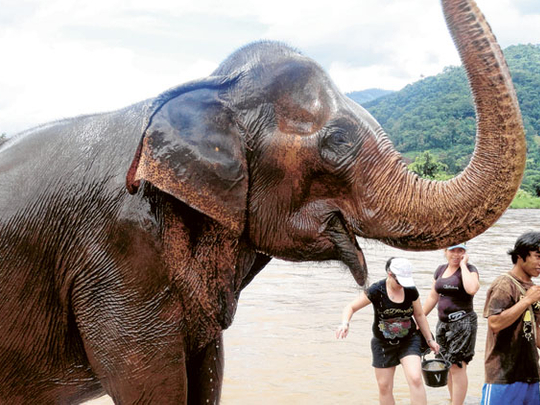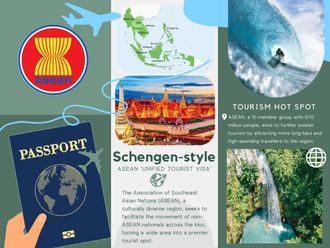
Guests volunteering at the Elephant Nature Park in Chiang Mai province, Thailand, don't have phone service or television. But what they have instead is ele-vision, all day long.
They can see elephants eating, playing in the mud, bathing and even floating in a river. They can watch large family groups and their ever-shifting relationships, which one observer compared to a soap opera. The park is home to 36 elephants, most of them rescued from handlers who had them begging for food in the streets or hauling timber, carrying tourists on treks or doing tricks in "elephant shows". The elephant is Thailand's national symbol, but tame elephants are considered livestock. Most of the park's elephants endured brutal training and decades of work, and some are now disabled. A few have been crippled by landmines.
The Elephant Nature Park offers sanctuary and a calmer life, and its founders are hoping to show Thailand that there is another way to treat elephants.
The elephants include family groups surrounding the park's babies, Chang Yim and Faa Mai, rambunctious bull Hope, and duos such as Jokia and Mae Perm. Jokia is blind and Mae Perm has become her "seeing-eye elephant". The elephants have deep and complex bonds but there are often conflicts and jealousies. The elephants also have personality to match their size, and their trunks give them an almost endless variety of facial expressions.
The park offers a series of packages, starting with day trips for about $80 (Dh294) per person, while a week's stay as a volunteer costs under $400 (Dh1,469) per person, including food and a place to sleep. There isn't much privacy and the accommodations are pretty spartan — there's no hot water and the power sometimes cuts out, taking the water down with it — but the food is delicious.
Volunteers spend three or four hours a day working at the park, with about two hours of work in the morning and another one or two in the afternoon. They mash bananas and clean fruit, plant trees and sugarcane, build fences and clean the elephant shelters. Yes, that means volunteers pay to shovel elephant dung. It doesn't smell, but there are 36 elephants, so there is a lot of dung to shovel and pitchfork away.
Thailand's climate is humid and temperatures at the park often reach 30°C. Casual tourists and elephant fans might find a full week's stay intense, but it's worth the work.
The days are paced well, and the rewards are remarkable. After work in the morning, the elephants crowd up to the main building and volunteers feed them bunches of bananas and sliced watermelon and mango. After lunch, the ele-phants bathe in the river. (They can bathe themselves, but they're happy to let the volunteers throw buckets of water on them in return for treats from their handlers, who always accompany them.) Later in the afternoons, the park offers work sessions alternating with trips to a local school, shadowing the park's veterinarians, and film screenings and talks.
At night, the valley comes alive with the chirping of crickets and the croak of frogs, as the volunteers relax from their hard work. But thinking about one's experiences here at the end of a long day is different from reflecting on the typical vacation. After all, people here are not just tourists, they are visitors in the land of the elephants.
For more information visit www.elephantnaturepark.org
Chiang mai, Thailand
FLY... Emirates and Bangkok Airways
From Dubai (via Bangkok) to Chiang Mai for Dh4,500.
Or try Thai Airways, from Dubai (via Bangkok) to Chiang Mai for Dh4,450.
— Information courtesy the Holiday Lounge by Dnata. Ph: 04 3492886






